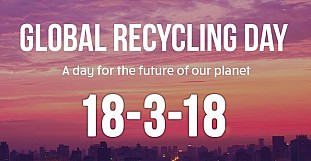December 13, 2017
The Bureau of International Recycling (BIR) is organizing the first ever Global Recycling Day, scheduled for March 18, 2018. The goal of this global event is to raise awareness of the importance of recycling. BIR is not widely known in the United States, but it is the only global recycling industry association. The organization represents around 800 companies and 35 affiliated national recycling federations from 70 countries.
In advance of Global Recycling Day, BIR produced “Recycling: The Seventh Resource Manifesto.” According to the report’s authors, “We have woken up to the idea that we need to use waste as a resource if we want to save the world from drowning in it.” Nonetheless, it is painfully obvious that in the United States—and, as the authors note, around the world—recycling has failed to gain universal support and participation.
Global Recycling Day is being launched by BIR to build on growing interest in the Circular Economy and related concepts. To recognize the importance of recycling for the world’s economies and resource conservation, global, national, regional and local events are being organized; as the authors note, the goal is to “create a positive image of recycling to the broader public as well as government authorities.”
BIR is asking people around the world to look at the goods and materials we use and discard every day and to rethink the word “waste”. Water, air, oil, natural gas, coal, and minerals are the world’s most important resources. These six resources provide our energy, consumer goods, clothing, food production, transportation, and more; in short, the very things which humans depend upon for their sustenance and survival.
These core resources are finite and being used up at a rapid pace, without giving thought to what will replace them. Moreover, an unsustainable amount of these resources ends up in landfills or incinerators around the world. According to BIR, the world’s population disposes of 2.12 billion tons of waste each year.
“The Seventh Resource”–metals, textiles, paper, plastics and other recycled materials—can be used over and over, some of them indefinitely. Using recyclable materials in manufacturing of course reduces our reliance on virgin materials. Currently, the Seventh Resource supplies 40% of the world’s raw material needs. But many recyclables, in particular plastics, are recycled at far lower rates; 91% of plastic manufactured isn’t recycled.
The use of recycled materials in manufacturing reduces pollution associated with the manufacture of goods using virgin resources. According to BIR, use of the Seventh Resource saves more than 700 million tonnes in CO2 emissions (771 million US tons) annually.
 Recycling is also beneficial for local economies. According to BIR, around 1.6 million people worldwide are employed in processing recyclables. And in the next 10 years, the annual contribution of the recycling industry to the global GDP is projected to exceed $400 billion.
Recycling is also beneficial for local economies. According to BIR, around 1.6 million people worldwide are employed in processing recyclables. And in the next 10 years, the annual contribution of the recycling industry to the global GDP is projected to exceed $400 billion.
The Manifesto asks the world’s citizens and policy makers to recognize the true economic and environmental value of recyclables. We must rethink what we waste and elevate recycling to an issue of global importance.
BIR outlines seven challenges for world leaders in order for them to view recyclables as the precious Seventh Resource:
- Implement and strengthen international agreements that promote recycling, and negotiate new ones as needed.
- Support and promote the sustainable trade of recyclable materials to ecologically sound companies across the globe.
- Educate, from the grass roots up, the public on the critical necessity of recycling.
- Agree to a common language of recycling (same definitions, same messages).
- Make recycling a community issue, supporting initiatives which help households and businesses provide Seventh Resource materials for repurposing.
- Work with the industry to encourage ‘design for recycling’ in the reuse of materials – reducing waste and integrating ‘end-of-life’ functionality at the design stage.
- Support innovation, research and initiatives that foster better recycling practices.
BIR also sets forth seven key questions for the world’s consumers about their own use of the Seventh Resource:
- Do I dispose of everything I have used (from plastic bottles to refrigerators to cars) properly, so it can be recycled?
- Do I know my municipality’s policies on recycling and do I follow them?
- Do I know what happens to my recyclables once they are taken away by my local municipality?
- Do I, my family and my friends, mend, repair and reuse in order to sustain the usefulness of the items around us for as long as possible?
- Am I committed to producing as little waste as I can?
- Do I know how, and do the brands that I buy make it easy for me, to make the right ‘recycling friendly’ purchasing decisions?
- Am I sufficiently aware of my government’s recycling legislation, or should I be demanding more?
The message of Global Recycling Day: if we want to retain the earth’s natural resources and ensure the future of our planet…the time for change is now.
By Athena Lee Bradley
Source: Recycling: The Seventh Resource Manifesto
To support Global Recycling Day:
- Learn about the recycling industry globally and locally through local recycling offices, NERC’s website, and other recycling organizations.
- Sign the Global Recycling Day petition to show the UN and world leaders the concrete steps that are needed to make recycling a truly global concern.
- Join in Global Recycling Day on 18 March, and share good practice on social channels across the globe.



Comments (0)
Add a Comment